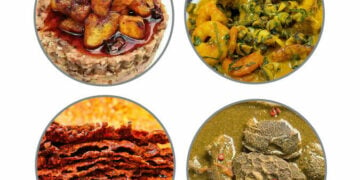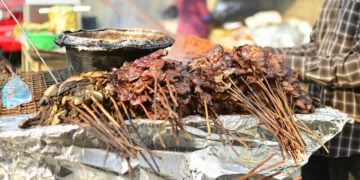With the increasing rate of insecurity in the country, do you subscribe to the view that the time is ripe to seek external help by bringing in mercenaries?
Well, I don’t think any country will say it wants mercenaries on its own because historically, when they come, they leave behind their own footprints. But we can do with technical advice because there may be some countries or some people who have more experience in this kind of warfare with the insurgents and bandits. So leveraging the experience of others as a country or as a group is very advantageous because we learn. So, to that extent, if you say the government should seek for technical advice and technical assistance from sources that are viable, yes.
You have repeatedly harped up on self-defence. Don’t you think that is defeatist since security is one of the key responsibilities of government, and the call for self-defence can be taken to mean the government is abdicating its own responsibility?
No, the government is not abdicating its own responsibility. In fact, by making that call, the government is providing leadership. People fail to understand that when we say protection of lives and properties is the responsibility of the government, it entails the government teaching and training people on how to keep out of danger, including keeping oneself armed. Self-protection is naturally instinctive. And I’m sure now if somebody comes to slap you, the first thing you will do is fend off that, and if you can, also pay him back. So the issue of self-defence is necessary. For instance, when you hear somebody trying to break your door, what will you do? Call the police who are two or three kilometres away from your house so that before the police arrive, this man would have come and killed you? And again, you also look at our circumstances. How many policemen do we have in Nigeria? I assure you in Katsina we don’t have up to 5,000 policemen. There are some local governments with 30 policemen with 10 guns, not all the 10 guns are AK47. Now, even if you have five thousand, we are projecting a population of 8 million, are you sending one policeman to 200,000 people. How many military do you have, the military combined with the air force, are they up to 200,000?
Are they not in 36 states plus Abuja? They are so thin that until we have the numbers, the equipment, we have to do something. That’s why I said we are training vigilantes to add to what is on ground with regards to police and NSCDC. So security is everybody’s business. Everybody has a role to play; the government is providing leadership, not abdicating leadership, by calling for self-defence.
Central to all of this is the availability of financial resources. Katsina is not one of the states that are doing well in terms of IGR. Why is this so and what is the administration going to do to boost the IGR?
You see, part of the problem created in this part of the country was initially the abolition of community tax for community development. We passed through an era in which the leader then was saying that the government has money and no need to collect taxes from people. So, people became lazy. An average adult today did not know when revenue was being paid. In advanced countries, there was never a time when, because of their performance, they said they should not pay taxes. When it was Katsina province, what was the main source of revenue? Tax, agriculture and livestock; then all the activities being performed by the state government today are those being performed by the native authority of that time and also making its annual contribution to the Northern Nigeria government. So the abolition of tax created a problem and now we need the political will to reintroduce it and enforce it. We have sent a bill to the state House of Assembly to re-introduce community and livestock taxes. We’re still waiting for them. And you should also note that in the entire country, especially in the Northern part, the informal sector accounts for more than 85 per cent of the economy. However, the challenge before us is how to bring this informal sector to a formal sector so that they will benefit and the society will benefit. The economy is too informal and this informal economy has become cultural in this part of the country. When you tell somebody to pay tax he looks at you as if you are asking him to commit a serious offence. But today, even people who are traveling have seen the negative effect of that because the tax receipt before was used as an identity wherever you go in northern Nigeria but today you have to hold a voters card or national identity card, if you are lucky to get a driver’s license to identify who you are. But that does not make you a responsible citizen. How many of the commercial vehicles are paying what they should pay? How many of the vehicle owners are paying? All these are elite and the big problem are the elite that are not willing to pay, and are not willing to contribute to the development of society that has given them everything. Most of the elite of my age and younger are part of the public institutions that were financed by tax money.
When you were talking about a bill to the state assembly, something struck my mind. I remember that the state passed the Child Protection Act, the public procurement law, and the fiscal responsibility law. But there seems to be problems with implementation of these laws…
(Cuts in) No, I don’t think so. The Child Protection Act has not been fully passed by the state assembly. As for the fiscal responsibility law, we have established the parastatal under the ministry of budget and planning. For the procurement act, the law is being dutifully implemented and that law guides all our procurements. So, the institutions that we have created and these ones you mentioned are working, but for the Child Protection Act, I’m not sure it is out of the assembly.
As a way of addressing farmers-herders clashes, the federal government gave Katsina N6 billion to establish a cattle ranch. What is delaying the project?
We are beginning with the establishment of 10 ranches in 10 locations of the most affected areas. I’m sure that will consume over N3billion and they have also identified grazing reserves. I think they spent about N1.7billion on provision of grazing areas in some selected communities. So, what we did immediately when we got the money was to commission consultants because our budget is for N12billion, but we got only N6billion. So, some of the issues we are doing with the resources of the state because the money given to us would have to be audited one day. So, we want auditors coming either from the federal ministry of Finance to see the money we got, what has been done and how we arrived at each decision.
What sort of Katsina do you want to live for your successor?
Well, a very peaceful one. In fact, a Katsina State that the people will see themselves as belonging to the state irrespective of the political zone they come from and leadership will be identified by the quality of the person, not where he comes from.
You know, we are lucky in Katsina, as 100 per cent speak the same language, have the same culture, and at least 95 per cent believe in the same religion. I think we have everything that is needed to have a very peaceful state. I am very grateful to the people of the state because I am the first person from the Southern part of the state to be elected governor. And that they gave me the mandate in 2015 and 2019 was a clear testimony that Katsina has moved away from where you come from, to what we can do for us. That’s the kind of Katsina I want to leave behind where this dichotomy does not exist. The Katsina and Daura people should see themselves as one. There is need for fairness and inclusiveness and there is need to give everybody hope that anybody can be in that particular office that is important in the state, irrespective of where he comes from and irrespective of which family he comes from. This administration is doing everything possible to ensure that. That is why whatever we do in any section of the state we also replicate it in other sections. The only consideration that varies is in terms of insecurity where we accord most priority to areas most affected.
With all the discontent that emanated from your party’s primaries, do you think the APC stands a good chance ahead of the 2023 polls?
Look, what you fail to understand with primaries all over the world, especially in the Nigerian political system, is that you can never have primaries, even if it was between two people, without the loser feeling some pain. In Katsina, for instance, we had nine governorship aspirants and out of these, only one clinched the ticket. So, how do we expect that the remaining eight will not be bitter? They are human beings and with time, explanation, appealing, appeasing, they will all overcome it and join hands together. Good enough, none of them who contested the election has left the party. The only exception is Tata and that is his culture and tradition. Others are still within the party, whether they are happy or not happy for now, they are still with the party. And we will continue to talk to them, to appeal to them, and work with them to make sure that APC succeeds in 2023.
We are in a pre-election year, with inflation at an all-time high, interest rate high, ASUU is on strike for a long time, insecurity is so deplorable, and the economy is terrible. Are you not worried that all of these indices will affect your party’s chances?
I disagree with you that it is terrible. Looking at you, who would say the Nigerian economy is terrible? Let us look at the positive sides. Is inflation a Nigerian problem alone? It is an international thing; it is all over the world. How much does a litre of fuel sell now in America, Europe, Ghana or Niger Republic? These are countries where we share almost everything together. It costs more than four times the price in these countries. Inflation is as a result of COVID-19 and now the Russian-Ukrainian war has affected the supply of many essential items, prices have been increased. Can Nigeria be an exclusion of that? You talk about banditry and insurgency. It has been at least very close to us in Chad, Sudan, Mali, Burkina faso, and even Niger Republic. When did it stop? We are not experiencing anything that is totally alien, but yes, it’s new to us. We were hearing it before, now it is with us.
You know, how many countries went into recession? Nigeria went into recession about two or three times, and came out in weeks. Many countries whose economy depends on one source like ours collapsed, but we have not. Nigeria is suffering from whatever is happening all over the world. In fact it could have been worse with the crash in the price of crude oil which at some point was between 100 to $140 before crashing at a point to $30. On ASUU, the federal government is not relaxing. Industrial action is part of the freedom of association that Nigerians are enjoying. Nigerians are enjoying this freedom to strike but in other countries, they dare not.
Don’t you think all of these may affect the prospects of the APC in the 2023 elections?
It will not. In fact, it will reinforce the party because people like you who understand know that nobody could have done better than us in APC, given the resources available, given the international dynamics of the economy, given the fact that some of the issues we are dealing with were not a creation of Nigeria, not even Africa, but international in nature. Also, do not forget the fact that we also have refused to appreciate the fact that if Ghana is paying 800 Naira per litre and you are paying 200 Naira per litre, you know, something is wrong. Before this government came in, they had run down all the refineries. Today, most of the equipment has become outdated and obsolete. Now, the country that is exporting crude is now importing refined products. That is why we could not even benefit from the high price of oil. In addition, I want you to remember that there was a time within more than the seven years of the Buhari administration when the production fell to 500 barrels because of militancy and theft in the Niger Delta and yet the country did not collapse. And I think this government, the APC government, should be celebrated because we inherit the problem that we did not create and we confronted them with whatever arsenal at our disposal, and we are still able to keep the country together.
Less than one year to the end of your tenure, can you say you have delivered on your administration’s Restoration Agenda?
First, let us look at what we promised the people as part of our restoration agenda in education, health, water, agriculture, security and environment among others. When we look at what we met on ground and what we are doing now, we can say that yes, we are satisfied with what we have done. This is so considering the little resources that were available to the government, coupled with the economic downturn, occasioned by the negative effect of COVID-19 that we are still suffering. If you look at the resources available to this government and the resources that were available to the previous administration within eight years and what we had been able to do, I think we are quite pleased with ourselves in terms of addressing those areas that we had promised. Of course, we could have done better if not for the downturn of the economy. You could recall that even before COVID-19, in 2017 around November and December, the price of crude oil dropped to $27/28 per barrel. In fact, someone said it was even below the economic cost of production per barrel. We were in that situation when COVID-19 came. There is also the issue of insecurity in the Northwest and some parts of the country, which started from herder-farmer conflicts, cattle rustling, and later developed to kidnapping, banditry, and rape. In fact, it turned into a full-blown insurgency with sophisticated arms and ammunition available in the hands of many people through the trans-border shipment and illegal routes between Nigeria and other African countries. These challenges notwithstanding, we have done some positive things as a government in all the areas we promised. In fact, nobody has intervened in education as we did, except for the late President Umaru Musa Yar’adua who, as governor, made some intervention when resources were available then.
If you look at the things we engaged in when we came in 2015 and the results you will see clearly that we are delivering on our promise to reposition education, for instance. Take the level of performance in terms of WAEC and NECO when we came in. For NECO it was 20 per cent and in WAEC, it was 10 per cent. But if you look at the figures today, we are having over 70 per cent of those who have five credits in any subject and over 65 per cent of those who have five credits, including English and Mathematics. That is in WAEC. In NECO the figures are even higher; the rate of passes is over 80 per cent. So, when you compare all that you will know that we have made some progress. Look at the level of rehabilitation within the last seven years; we have been able to provide counterpart funds for primary education. We have made direct intervention in some areas without even the counterpart funding. In addition, the local government themselves also made some interventions in many areas by providing classrooms, school desks among others.
So, putting all of these in perspective, we have done well despite all the challenges. Better still, if you want to be fair to the administration you have to look at the challenges, especially the resources available and what we were able to achieve with the little resources. We can simply say we’re comfortable with what we have done and how far we have gone in all the sectors. Today, if you look at water supply, what we have done in Ajiwa is so remarkable. Ajiwa is now a brand new treatment plant that is providing optimally the desired capacity of 50 million litres per day because all the obsolete equipment were replaced. Look at our hospitals; when we visited the Katsina general hospital recently, even the Emir of Katsina was marvelled at the level of development. He said the last time he was at the hospital was when he was the Magajin Garin, and when he came, he could not believe it was the same general hospital. We did the same in Daura, Baure, Funtua, Malumfashi, Kankia, Musawa, Dutsinma, Jibia and Rimi towns just to improve the health care delivery services. In addition, we have employed and trained personnel. I am happy with what we are doing in the health sector. Yes, we are training doctors and they are leaving. That is what we want – to keep training them and let them leave.
In spite of the investment you said was made in the Water sector, residents of Katsina metropolis still complain of water scarcity. What is actually the problem?
People fail to appreciate one thing. When we came, Ajiwa that supplies water to Katsina metropolis and its environs was not providing 50 per cent of its installed capacity. Today, Ajiwa is providing over 50 per cent of its installed capacity. The installed capacity is as at 1974 when government commissioned Ajiwa. In 1981, for instance, the second clarifier was commissioned which is giving 50 million liters per day. The Ajiwa was meant to supply Katsina and be a regional water supply scheme. It was to provide water to Kaita, Mani, Mashi and Rimi, but today not a single drop of water is going to Mashi or Mani. So, we are trying to restore all that. The growth in population ultimately affects water use and people do not see the growth, but let them start with their families. I’m sure that since 1981 a household of 10 people today has over 100, depending on the same source that is dwindling. I want you to imagine the population of Katsina in 1974, 1980 and today using the same source of water supply. Clearly, there is a need for expansion. In order to prepare for that we have completely rehabilitated the dam; we have consultants who did the design for upgrading the dam to store more water and we have cleared the place for another clarifier that will add 25 million liters per day. Then you have the Zobe dam that President Muhammadu Buhari completed and commissioned that is bringing additional 70 million litres per day. Zobe was designed in 1990 and the construction started in the 80s. It was abandoned until the coming of this government before it was installed at its capacity. That is why we have many boreholes. In the past, an attempt was made to establish a semi-urban water supply scheme in Katsina but when we came, all was abandoned because of negligence. We went and rehabilitated them, put them into use and are supplying diesel. Now the government has taken responsibility for supplying diesel to all these semi-urban water supplies in the city. We are spending hundreds of millions and the local government areas are also spending to support some of these schemes. We realise that the institutions are falling apart and we have to rebuild the foundation. So, anybody coming and wants to improve the water supply in Katsina has a starting point. When we came, the starting point was weak; the pumps were old and cannot supply water for up to 24 hours without breaking down. In fact, they were not delivering. If you go to the station and the pump housing, all the pumps are brand new. We have to install a generating capacity of over 2,400 megawatt in order to support Ajiwa. And we are spending over N400million now to build substations. You go and see what we are doing. The idea is to restore all these things so that the next administration can move forward. Without a solid foundation, you cannot make any progress.
Agriculture is the main state of Katsina economy. What is your administration’s investment in this sector and the outcome?
We also prioritised investment in agriculture, which is also key to our restoration agenda. That is why my deputy is the commissioner of agriculture. We thank God that throughout the seven years of this administration; we have not witnessed any drought or failed cropping. Also, we thank God that food prices have been very good as far as the community is concerned. To boost farming, we have implemented different policies and also intervened and supported the Anchor borrowers’ programme. We also thank Mr President because if not for his foresight to close the border and stop importation, insisting that we produce what we eat and eat what we produce, probably with the COVID-19 that made it difficult for us to import, the situation would have been terrible. Also, with the collapse of the Naira against dollars because of the international collapse of the economy, we wouldn’t know where we would have been today. We are able to support farmers and the impact of such support is being felt all over, including the fact that we are confident of achieving self-sufficiency in food production.





